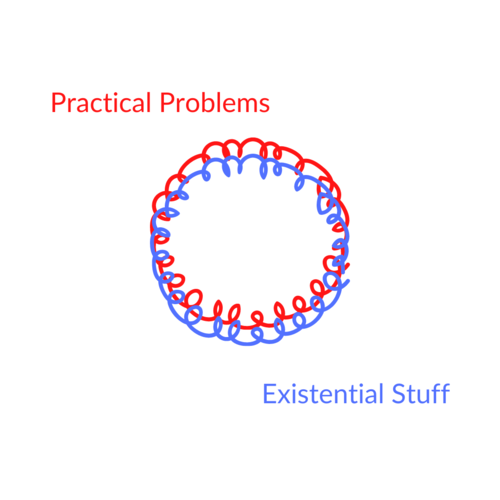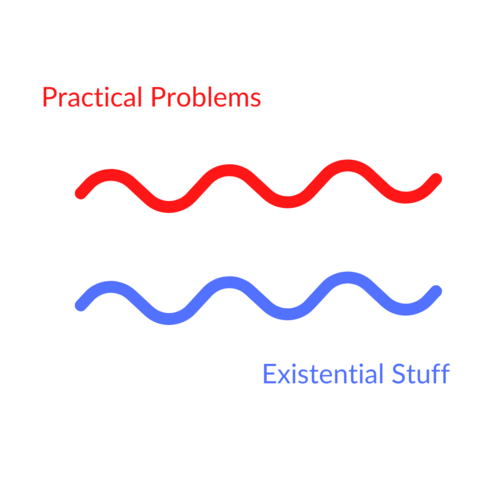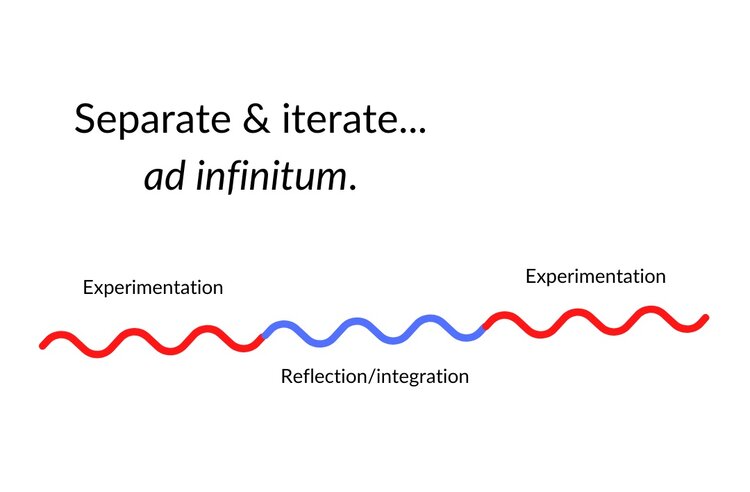Timebox Your Existential Issues
How to timebox your existential issues - both to feel better and to think better.
If you're prone to abstract thinking and you have a busy brain, then it's likely that your day-to-day life is characterized by frequent flipping between the totally mundane and some seriously higher-level stuff.
Here's you muddling around and thinking in a circle about mundane and high-level stuff, all mixed up:

For example:
- You have a minor issue with your boss at work. You start to try to redo the task, but are soon wondering whether you should leave your job, whether the company is morally good enough, and whether work ever offers meaning in life.
- You have a minor quibble with your partner. The two of you begin trying to find a compromise and a new way of handling the matter, but you spiral into deep questions about your compatibility, the overall quality of the relationship, and power in relationships writ large.
- You encounter something that you don't like about your current home/location (e.g. street noise, a long commute). This gets you to thinking... "maybe I should move!"
What's wrong with thinking about everything all at once?
This level-flipping sort of makes sense: many aspects of life can appropriately be considered and treated in different ways. Your busy brain is trying to consider all the angles. But it's all mixed up.

Unfortunately, considering all the angles simultaneously tends to be just plain exhausting. Plus it's hard to generate any evidence in your life for the bigger questions without doing and trying things. But running in the same circles in your head distracts from that on-the-ground process and keeps you paralyzed or halfhearted instead.
So the "evidence" you get about the problem at hand is either low quality, or you don't even notice or deploy it well anyways. Scattershot level-flipping can make you less likely to get unstuck and to develop clarity, not more. What now?
Separate the practical & existential
When this happens, find a way - any way - to separate the practical and existential elements of your issue so you can focus on one while you hit pause on the other.

For example:
- You decide to stay at your job for 6 months, and mark your calendar to re-evaluate then. In the meantime, you buy a book about communication in the workplace and ask your boss for a 1-on-1 to clarify that problem project. You still don't know if this job is appropriate for the long term, but you'll find the limit of your effectiveness there if you first focus on improving your relationship with your boss for a little while.
- You remind yourself that you simply don't need to form a theory of power in relationships right now. You take a step back and acknowledge the quality of this relationship is still way above satisfactory, so no breakup is yet in order. You decide to "zoom in" on the particular cause of the fight and spend some time figuring out just how much alone time/together time you need. The bigger questions are interesting but they are not urgent to figure out.
- You realize that there's no clear candidate for a new city to move to, so you set aside the question of "should I move?" until next year. In the meantime, you decide to take reasonable measures towards making your current city more livable - noise cancelling headphones, occasional car rides instead of the flaky bus, more or less working from home, etc. Once you find out how good (or bad) your current city must really be, you'll later find yourself in a better position to decide whether to move.
Respect your limits
The truth is that practical and existential issues *are* in fact deeply intertwined. Nonetheless, respecting your cognitive and emotional limits as a pragmatic matter may demand their separation.

Moreover, philosophical questions about meaning and value are not solvable completely from the armchair. These questions are answered at least as much by living as by thinking.
So letting looming philosophical questions put too much of a constant damper on real life constantly threatens not only the pleasant living of life but also making progress on the philosophical stuff itself. Timebox your existential issues both to feel better and to think better.
Pamela J. Hobart - Philosophical Life Coaching Newsletter
Join the newsletter to receive the latest updates in your inbox.